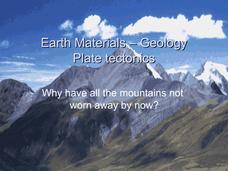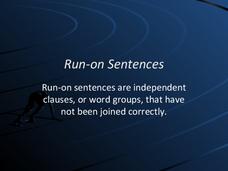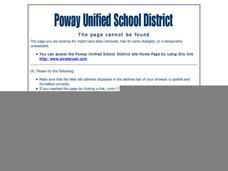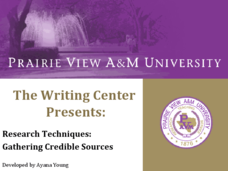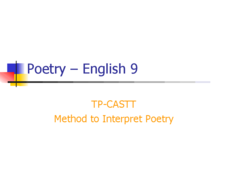Curated OER
Electronics and Alarms
Various situations are listed here and the state of conditions listed. The effect of those conditions on resistance in electronic circuits is explained and then pupils are told whether the transistor is switched on or off. These details...
Curated OER
Earth Materials - Geology and Plate Tectonics
Not going into depth on any one topic, this Earth science presentation skims the crust. It touches on the materials that construct the crust and then moves into plate tectonics. This is a useful and colorful note-taking guide for your...
Curated OER
Ice Ages
Interested Earth enthusiasts are introduced to ice ages. The 26,000-year cycle is charted and the eras named. Several slides are dedicated to the carbon cycle and how it contributes to the changes. The reasons for the cooling of the...
Curated OER
Run-On Sentences
What exactly are run-on sentences and comma splices? Polish the writing skills of your middle and high schoolers with this brief presentation. First, each term is defined and an example is given. Then, different ways to revise run-on...
Curated OER
Semicolons
When do you need a semicolon? Help your class better understand this tricky punctuation by offering this presentation. Although the PowerPoint is very short, the slides are text heavy. Provide some opportunities to practice using the...
Curated OER
What is Plagiarism? Who Cares?
Who really cares if you plagiarize? Help your class recognize the importance of citing information correctly. Use this presentation to define plagiarism, citation, and common knowledge. Conscious and unintentional plagiarism are also...
Curated OER
Annotated Timeline of The American Literary Movement
How did literature evolve in America? This presentation briefly covers the transition from Puritan American all the way until today's Contemporary Period. Key figures from each time period are introduced, and a brief overview of each...
Curated OER
What are Earthquakes?
Here is a scientific presentation of earthquakes. The elastic rebound theory is explained, as well as the different types of waves and how they are measured. Just a note: Slide number 15 has a diagram that is upside down. Enable editing...
Curated OER
The Dust Bowl: Images
Introduce learners to the hardships that followed the onset of the Dust Bowl. There is a quote taken from The Dust Bowl, Men, Dirt and Depression by Paul Bonnifield followed by 10 primary-source images.
Curated OER
Figurative Language: Similes
How does one identify a simile, and why is it important to understand what they are? Here's a very basic review. This short presentation defines the term, provides examples, and gives learners a chance to identify which two things are...
Curated OER
The Work of Waves and Wind
This is not revolutionary, but it is informative. Earth science viewers in grades 7-12 get carried away with wave and wind erosion. They view diagrams of how waves impact ocean shorelines. They see examples of the different types of sand...
Curated OER
World War 2: Facts
Useful as a simplistic introduction, this resource provides basic information regarding WWII. Learners can read about the first steps taken by Adolph Hitler, Neville Chamberlain, and the end result of the war.
Curated OER
Legacy of the Dust Bowl: Dust Storm Media 1930s
Some learners might not realize that the term dust bowl was not figurative. Show the reality of 1930s America with eight primary source photographs. Slides depict images of dust storms or their aftermath.
Curated OER
Plagiarism
The definition for, consequences of, and how to prevent plagiarism is the subject of a presentation that also includes information on how to properly quote or paraphrase a source. Viewers can check their understanding with a series of...
Curated OER
Proofreading
Reading backward and moving from word to word with a pencil are just two of the many strategies employed by proofreaders that are included in a presentation about the editing stage of the writing process. In addition, viewers are asked...
Curated OER
Greek Myths
Ever wonder why the ancient Greeks had myths? The explanation you'll find here, describes myths as stories that explain things people didn't understand. They also tell the stories of the gods people in ancient times believed in. These...
Curated OER
Transformations
For any study of upper-level geometry, this presentation could be of good use. It defines three important concepts: transformation, reflection, and rotation. Although brief, this presentation could easily be used in tandem with problems...
Curated OER
Rosa Parks
Facts and transcripts of Rosa Parks are transcribed in this 9-slide PowerPoint. The slides include a brief biography, history of racism, which lead into Rosa Parks' refusal to give up her seat. What follows are slides about her feelings...
Curated OER
Research Techniques: Gathering Credible Sources
How can you spot a credible source? What even makes a resource reliable in the first place? Answer some of these questions with this presentation. Although intended for higher education, this PowerPoint could be modified for middle...
Curated OER
Vocabulary Set 11: English 2
Study a variety of words that begin with cad/cas/cid, coming from the Latin verb, cadere. Then, look at some other words that use the roots cis and hom. The word's definition and a sentence using each word is displayed on each of 16...
Alabama Learning Exchange
Poetry-English 9
Are your readers lost in the world of poetry? Show them this basic presentation to study elements of a poem. They learn the importance of the title, paraphrasing, connotation, tone, shifts, and theme.
Curated OER
Integrating Quotations, Paraphrases, and Summaries Effectively
Integrating quotations, paraphrases, and summaries into a paper can be a challenge. After the terms are defined and the difference among them illustrated, viewers are shown correct and incorrect inclusions of quotations. Preview the...
Curated OER
Poetry: Basic Elements of a Poem
People who pen poetry positively need to know basic tenets and terms of poetry, like alliteration and consonance, for example. These and other terms are define and illustrated. Then viewers are given an object and asked to craft a...
Curated OER
The Writing Center: Prepositions
While the focus is applicable to middle schoolers, high schoolers, and higher education, the slides are text heavy (as they were originally designed for higher education). Learners will review rules for using a preposition and how to use...



